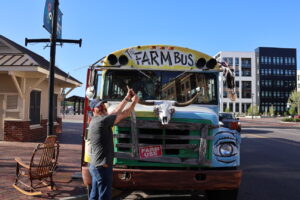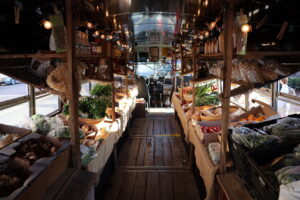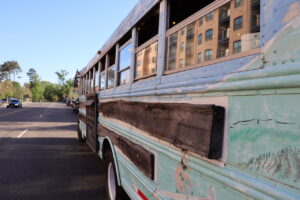
Mark Lilly and his portable farmers market on wheels in Libbie Mill. The Farm Bus has been in operation since 2009. (Photos by Bettina Johnston)
By Bettina Johnston and Logan Jones-Wilkins
The West End of Richmond is nobody’s idea of a food desert. And Libbie Mill, a newly minted townhouse complex in the heart of the West End, is one of those upscale suburban town centers that are springing up on the periphery of cities all over America. No one goes hungry here.
So it’s odd, on a Thursday, to find a hand-painted, multi-colored Reagan-era school bus in the town square—a rolling fruit and vegetable stand that used to be the domain of a man on a mission, working overtime to bring healthy food to Richmond’s poorest neighborhoods.
Yet there they were, surrounded by the glittering facades of newly finished luxury apartments: Mark Lilly and his Farm Bus.
Lilly is a bearded, middle-age man in a baseball cap and a gray tee-shirt declaring, “Believe in Yourself.” As we talked, he tended to his customers, mounting the steps of the Farm Bus to show a smattering of White, seemingly affluent women the bins of produce and specialty items displayed on either side of the aisle.
After they checked out, Lilly pulled a well-worn magazine from a shelf above the drivers seat: the July 26, 2010 issue of People magazine, which featured the Farm Bus and a much younger Mark Lilly. People described Mark as an entrepreneurial idealist, who’d bought a used 2007 church bus on Craigslist and outfitted it to fight hunger.
One photograph showed the bus parked in a low-income neighborhood next to a convenience store, quite the opposite of Libbie Mill. The caption reads: “The Farm Bus serves Richmond neighborhoods where convenience stores are often the only option for buying food.” The article offered a glimpse of what the Farm Bus started out to be.
Back then, Lilly, who joined the Marines after high school, had graduated from VCU and was in a Master’s program at the University of Richmond, studying Disaster Science and Emergency Management.
In a course called “Hazards and Threats of the Future,” which Lilly took in 2009, he designed a 20-year forecast that predicted famine and severe hunger in Western developed countries. Alarmed, he created a business model to answer the question: “How do I create a more sustainable food system and food model when the one that’s in place collapses?” His solution was the Farm Bus, which he modeled after older systems un place 100 years ago such as milk trucks.
“I didn’t reinvent the wheel, I took an old concept, packaged it really nice and put it back on the road.”

Thirteen years later, the bus itself remains the same, but Lilly’s original business model vanished in the rear view mirror a long time ago. His old customers just weren’t interested, he said. Their eating habits were set, and they couldn’t afford his prices. The Bus was a bust.
“People don’t suddenly go from shopping at an unhealthy convenience store to shopping at the new healthy supermarket,” writes Hunt Allcott of Stanford in the Quarterly Journal of Economics. “What happens is, people go from shopping at a far-away supermarket to a new supermarket nearby that offers the same types of groceries.”
In Richmond, that reality is further complicated by the city’s long history of “redlining” Black neighborhoods, draining them of wealth and isolating them from vital services including public transportation and grocery stores.
“These communities did not wake up all of a sudden and not have a grocery store,” said Richmond’s Duron Chavis, a nationally prominent farmer and food justice advocate, in a recent video. “There is a history of design flaws, or intentional discrimination and systematic racism, explicitly in communities of color across the country.”
“Grocery stores don’t make a lot of money,” Chavis went on. “As a result, if a grocery store is eyeing a particular location to set up, it’s definitely not looking at a place in the middle of the hood that has been neglected and denied resources for investment.”

Mark Lilly may not see it in those terms, but he knows what he has to do to make a living. So today the Farm Bus is parked far from the hood in Libbie Mills, alongside specialty frozen yogurt and luxury lobster food trucks with long lines of families and hipsters queuing up for six-dollar cones and $12 lobster rolls.
He had no choice, he says, echoing the name-brand grocery store chains that have forgone locations in predominantly Black neighborhoods.
The only difference? It is a lot easier for Mark Lilly to move his bus.
Here is a link to the podcast on Soundcloud.
